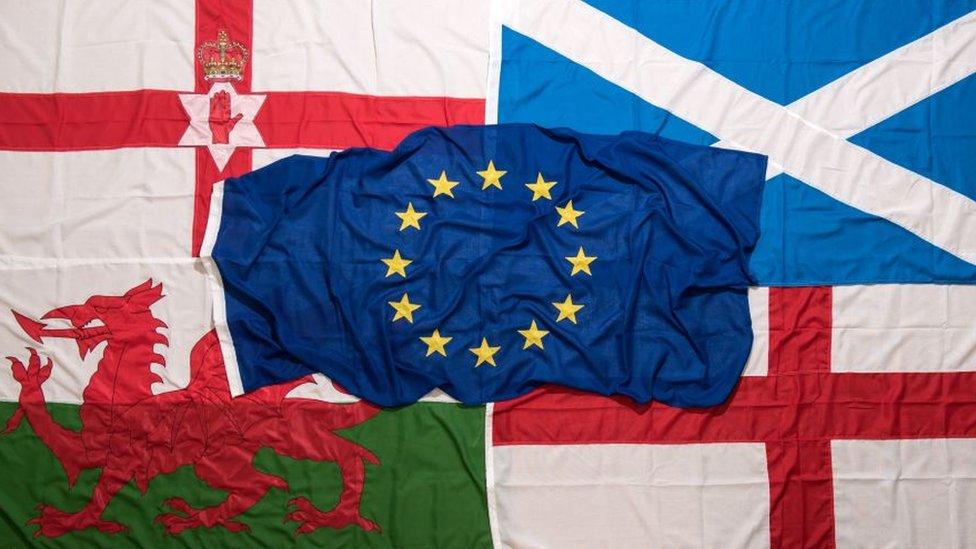How Brexit shapes people's views on Scottish independence
- Published

Three polls of how people in Scotland would vote in another independence referendum have been published since the UK left the EU single market and Customs Union at the turn of the year.
Like every other poll since last June, all three put Yes ahead of No.
However, they do not suggest that the UK's exit from the EU single market resulted in any further increase in support for independence.
Indeed, at 53% the average level of support for Yes was slightly down on the 55% recorded by the same three polls at the back end of last year.
That said, the three polls show how Brexit continues to influence people's views on independence. On average, only 39% of those who voted Leave in 2016 say they would vote Yes, compared with 59% of those who backed Remain.
Given that Scots voted in 2016 by 62% to 38% in favour of remaining in the EU and that, according to Panelbase, would now vote by a similar margin in favour of rejoining the EU, the UK government's Brexit policy does not help it in its attempts to persuade Scots of the merits of sticking with the Union.
The same Panelbase poll, conducted for the Sunday Times, also confirms previous polling evidence that more voters believe that an independent Scotland would have handled the pandemic better (42%) than reckon it would have been handled worse (23%).
Emotional pull
Crucially, one in five (20%) of those who voted No to independence in 2014 believe it would have been better. This perception helps explain why support for independence is now three points above the 50% level at which it stood immediately prior to the first lockdown last March.
Whatever the current state of the polls, Unionists might hope that, whatever the arguments about Brexit and coronavirus, voters will eventually feel the emotional pull of being part of Britain.
However, Panelbase's poll suggests that while 41% of Scots would be upset if Scotland left the Union, rather more, 48%, would be pleased. As many as one in three (33%) say they feel Scottish but not British.
Against this, though, some still have doubts about the economic case for the Union.

Rather more believe that an independent Scotland would be financially worse off (42%) than reckon it will be better off (36%). And while 88% of No supporters believe that Scotland would be worse off under independence, only 71% of Yes supporters think it would be better off.
There may be some potential here for Unionists to win back voters to their side of the argument.
In the meantime, polling done for The Sunday Times in England, Wales and Northern Ireland suggests that there is a widespread awareness of the recent swing against the Union north of the border.
Nearly half of voters (49%) in both England and Wales think it is likely that Scotland will become independent in the next 10 years - as do 50% of Scots themselves. In Northern Ireland, as many as 60% hold that view.
Throughout the UK, many more believe that Scotland will become independent during the next decade than say the same about Northern Ireland. Scotland is now widely regarded as the weakest link in the Union chain.
But it appears that there is now as much support in Northern Ireland for holding a ballot on its constitutional status as there is in Scotland for holding a referendum on independence.

The recent swing against the Union north of the border has been noticed around the UK
In Scotland, 50% think there should be a referendum in the next five years, while 43% are opposed - a result that matches the findings of other polls last year.
Meanwhile in Northern Ireland, 51% would like a border poll within that timeframe while 44% are opposed, even though the same poll suggested that the outcome would be a narrow majority in favour of staying in the UK.
Some commentators have expressed the hope that, divisive as it was, the 2016 Brexit referendum would be the last such ballot to be held in the UK.
However, it seems that referendums are still regarded as an attractive way forward by those who wish to see constitutional change in Britain.
John Curtice is Professor of Politics at Strathclyde University, and Senior Research Fellow, ScotCen Social Research and "The UK in a Changing Europe".